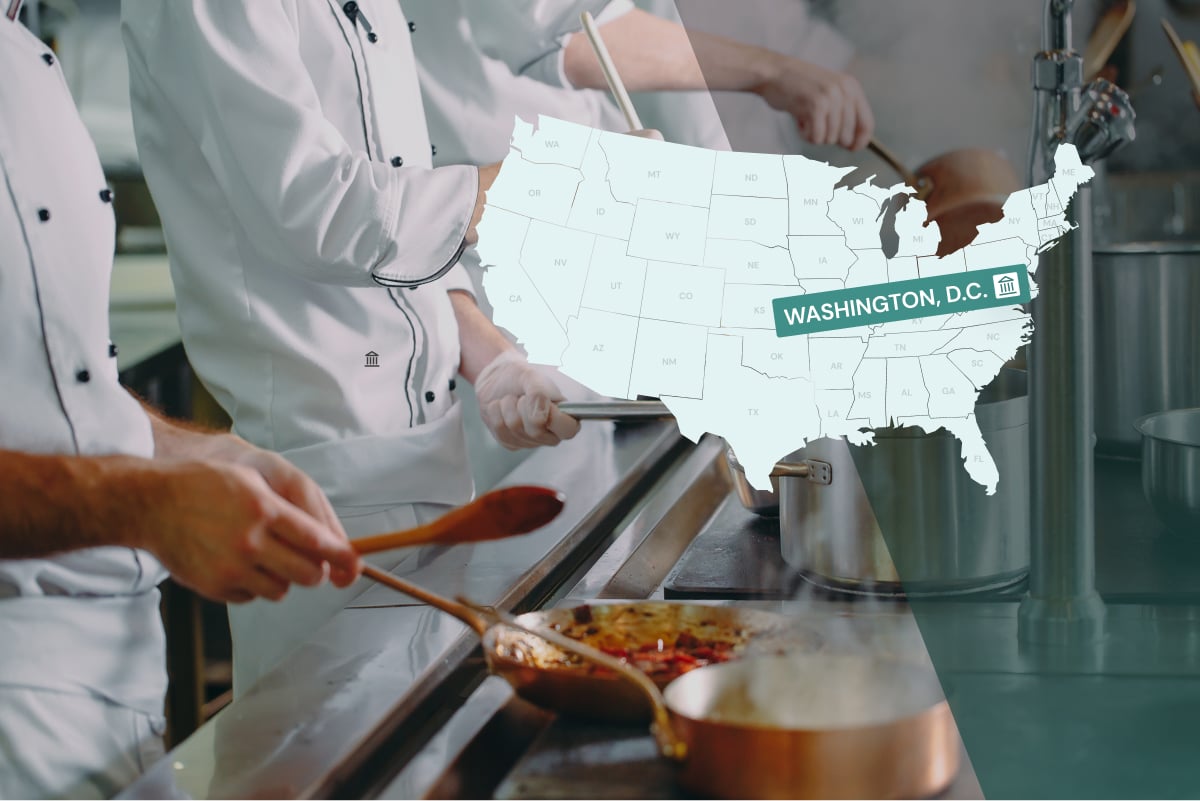Food safety and responsible alcohol service are at the heart of the hospitality industry—and it’s just as important in our nation’s capital as it is throughout the rest of the country. While technically not a state, the District of Columbia operates like a state and also has the functions of a city and county. Like anywhere else in the United States, there’s a thriving, diverse food and beverage scene to be found in D.C., with its own unique food safety and alcohol service requirements.
Washington, D.C. adopts elements of the Food and Drug Administration's (FDA) Food Code into the District’s Food Code, just like most states (minus California). While food safety and alcohol awareness training requirements vary for foodservice professionals in Washington, D.C., the industry still takes federal recommendations seriously.
Read on to learn more about:
Which version of the FDA Food Code does Washington, D.C. use?
Does Washington, D.C. require food handler training?
Does Washington, D.C. require allergen awareness training?
Does Washington, D.C. require food manager certification?
Does Washington, D.C. accept certifications from other cities or states?
Does Washington, D.C. require alcohol awareness training?
Which version of the FDA Food Code does Washington, D.C. use?
The FDA Food Code outlines federal food safety recommendations. States, territories, counties, and cities can then pick and choose which guidelines they choose to adopt. The FDA Food Code is an evolving document that the FDA updates every two years based on the newest information.
Washington, D.C. uses the 2009 FDA Food Code as a guide for the D.C. Food Code.1, 2 The 2009 Food Code does not mention food handlers, and does not require a person-in-charge (PIC) to be a certified food protection manager. However, the guidance does require every establishment to have a person-in-charge who can demonstrate extensive food safety knowledge and a basic understanding of food allergens and symptoms to a regulatory authority.
Does Washington, D.C. require food handler training?
No, food handler training and food handler cards are not required in Washington, D.C. However, your employer may have other requirements.
Potential employers may also find your resume more appealing if you’ve completed an accredited food handler training as well. This proactive step can help you stand out among job applicants as someone who takes food safety seriously.
Does Washington, D.C require allergen awareness training?
No, food allergen awareness training is not required in Washington, D.C. However, your employer may have other requirements, so you’ll want to check with them.
Additionally, ask yourself if you feel confident in serving customers with potential allergies. If the answer is no, you may want to complete an accredited allergen awareness course. Learning key allergen awareness knowledge and skills will help you feel more confident in your career.
Does Washington, D.C. require food manager certification?
Yes, establishments in D.C. require a certified food manager during all hours of operation.
Any establishment that qualifies as medium to high risk needs at least one person-in-charge to be a certified food protection manager, and they must be on premises during all hours of operation. Low-risk establishments require a “certified limited food protection manager.”2 Regardless of the slight title variation, according to D.C. Health, managers must complete an ANAB-CFP accredited certification program to stay in compliance for three years.3
Does Washington, D.C. accept certifications from other cities or states?
Yes, representatives from D.C. Health will accept credentials from another city or state if the licensee or person-in-charge has passed a certification examination from an approved provider.3
Washington, D.C. is a close neighbor to Maryland and Virginia. If you’re in the foodservice industry and live in the area, it makes sense to review those states’ requirements as well. You may find yourself applying for foodservice roles in Maryland and Virginia in the future, so a working knowledge of their food safety requirements can be helpful.
Does Washington, D.C. require alcohol awareness training?
Yes, Washington, D.C. does require alcohol awareness training for certain individuals. Under the D.C. Official Code, the District requires alcohol beverage control (ABC) managers to complete alcohol awareness training as part of their licensing process.4 This training has to be from a Board-approved provider, and you’ll need to recertify every three years from the date of initial certification.4
And while alcohol awareness training isn’t required for servers, employers may still require it for staff who handle alcohol, including servers, security, and bartenders, among others.
The takeaway
Washington D.C. looks to ABC managers and CFPMs to gain knowledge and expertise in food safety and responsible alcohol service, then bring it back to their establishment to share with the entire team. Don’t know where to start? Trust20’s ANAB-CFP accredited certification program and ANAB-accredited food safety trainings can help you or your management staff meet the District’s requirements. Although leaders in an establishment are typically the only ones with training and certification requirements, it is always beneficial to your customers, career, and business to consider ongoing training for you and your team.
Sources:
- FDA: 2009 Food Code
- DC.gov: The District’s Food Code
- DC.gov: Acceptable Organizations for CFPM Examination
- DC Official Code: § 25–120. Manager’s license requirements and qualifications





.png)

.png)
